#BBC News - Science & Environment
Text
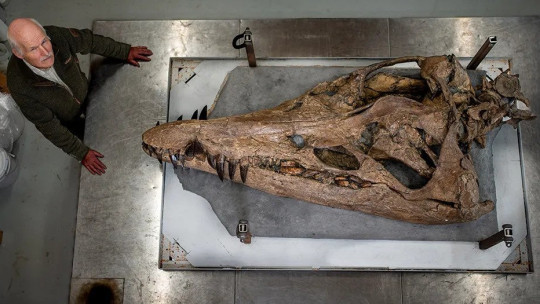
Gigantic Skull of Prehistoric Sea Monster Found on England’s ‘Jurassic Coast’
The remarkably well-preserved skull of a gigantic pliosaur, a prehistoric sea monster, has been discovered on a beach in the county of Dorset in southern England, and it could reveal secrets about these awe-inspiring creatures.
Pliosaurs dominated the oceans at a time when dinosaurs roamed the land. The unearthed fossil is about 150 million years old, almost 3 million years younger than any other pliosaur find. Researchers are analyzing the specimen to determine whether it could even be a species new to science.
Originally spotted in spring 2022, the fossil, along with its complicated excavation and ongoing scientific investigation, are now detailed in the upcoming BBC documentary “Attenborough and the Jurassic Sea Monster,” presented by legendary naturalist Sir David Attenborough, that will air February 14 on PBS.
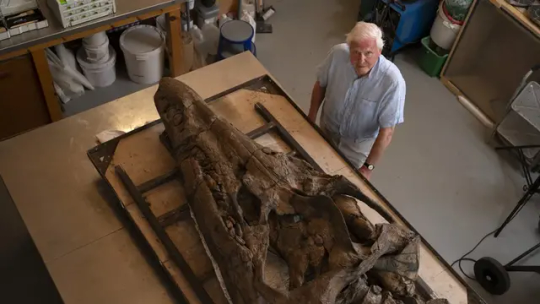
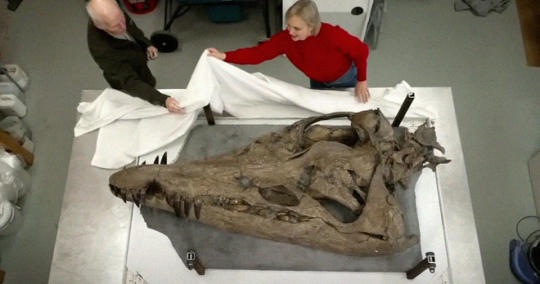
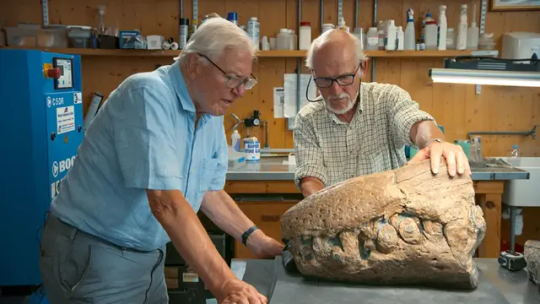
Such was the enormous size of the carnivorous marine reptile that the skull, excavated from a cliff along Dorset’s “Jurassic Coast,” is almost 2 meters (6.6 feet) long. In its fossilized form, the specimen weighs over half a metric ton. Pliosaurs species could grow to 15 meters (50 feet) in length, according to Encyclopaedia Britannica.
The fossil was buried deep in the cliff, about 11 meters (36 feet) above the ground and 15 meters (49 feet) down the cliff, local paleontologist Steve Etches, who helped uncover it, said in a video call.
Extracting it proved a perilous task, one fraught with danger as a crew raced against the clock during a window of good weather before summer storms closed in and the cliff eroded, possibly taking the rare and significant fossil with it.
Etches first learned of the fossil’s existence when his friend Philip Jacobs called him after coming across the pliosaur’s snout on the beach. Right from the start, they were “quite excited, because its jaws closed together which indicates (the fossil) is complete,” Etches said.
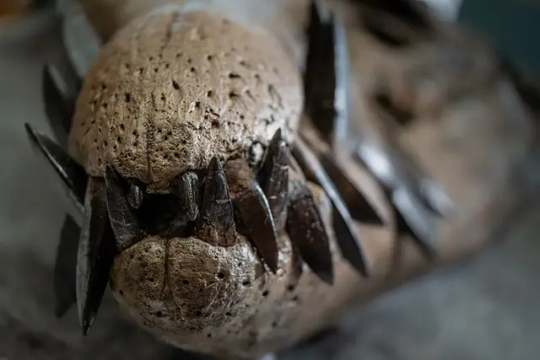
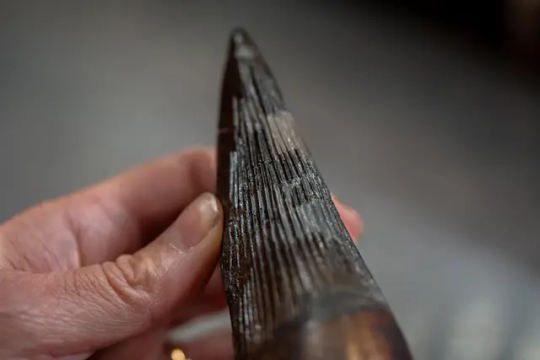
After using drones to map the cliff and identify the rest of the pliosaur’s precise position, Etches and his team embarked on a three-week operation, chiseling into the cliff while suspended in midair.
“It’s a miracle we got it out,” he said, “because we had one last day to get this thing out, which we did at 9:30 p.m.”
Etches took on the task of painstakingly restoring the skull. There was a time he found “very disillusioning” as the mud, and bone, had cracked, but “over the following days and weeks, it was a case of …, like a jigsaw, putting it all back. It took a long time but every bit of bone we got back in.”
It’s a “freak of nature” that this fossil remains in such good condition, Etches added. “It died in the right environment, there was a lot of sedimentation … so when it died and went down to the seafloor, it got buried quite quickly.”
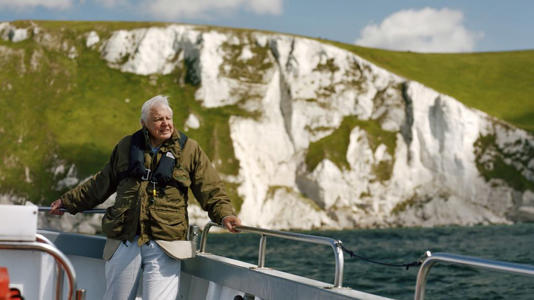
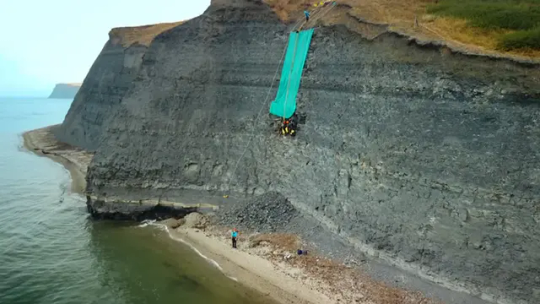
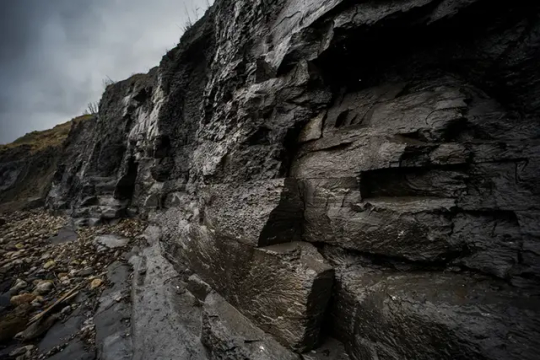
Fearsome top predator of the seas
The nearly intact fossil illuminates the characteristics that made the pliosaur a truly fearsome predator, hunting prey such as the dolphinlike ichthyosaur. The apex predator with huge razor-sharp teeth used a variety of senses, including sensory pits still visible on its skull that may have allowed it to detect changes in water pressure, according to the documentary.
The pliosaur had a bite twice as powerful as a saltwater crocodile, which has the world’s most powerful jaws today, according to Emily Rayfield, a professor of paleobiology at the University of Bristol in the United Kingdom who appeared in the documentary. The prehistoric marine predator would have been able to cut into a car, she said.
Andre Rowe, a postdoctoral research associate of paleobiology at the University of Bristol, added that “the animal would have been so massive that I think it would have been able to prey effectively on anything that was unfortunate enough to be in its space.”
By Issy Ronald.
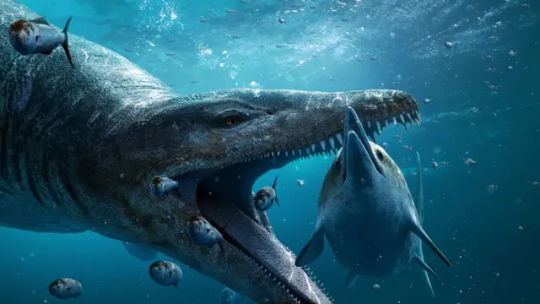
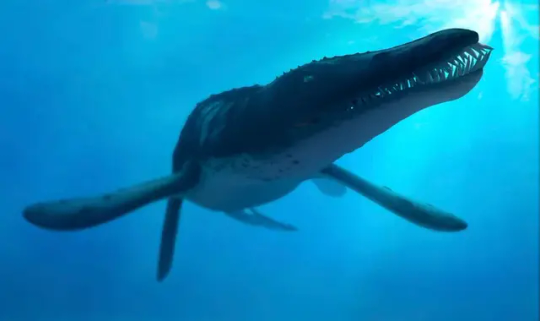
#Gigantic Skull of Prehistoric Sea Monster Found on England’s ‘Jurassic Coast’#Dorset England#pliosaur#jurassic#fossil#prehistoric#dinosaur#paleobiology#palaeontologists#archaeology#archeolgst#history#history news#ancient history#Sir David Attenborough#nature#naturalist
584 notes
·
View notes
Text
By Julia Conley
Common Dreams
April 25, 2023
Scientists are so alarmed by a new study on ocean warming that some declined to speak about it on the record, the BBC reported Tuesday.
"One spoke of being 'extremely worried and completely stressed,'" the outlet reported regarding a scientist who was approached about research published in the journal Earth System Science Data on April 17, as the study warned that the ocean is heating up more rapidly than experts previously realized—posing a greater risk for sea-level rise, extreme weather, and the loss of marine ecosystems.
Scientists from institutions including Mercator Ocean International in France, Scripps Institution of Oceanography in the United States, and Royal Netherlands Institute for Sea Research collaborated to discover that as the planet has accumulated as much heat in the past 15 years as it did in the previous 45 years, the majority of the excess heat has been absorbed by the oceans.
In March, researchers examining the ocean off the east coast of North America found that the water's surface was 13.8°C, or 14.8°F, hotter than the average temperature between 1981 and 2011.
The study notes that a rapid drop in shipping-related pollution could be behind some of the most recent warming, since fuel regulations introduced in 2020 by the International Maritime Organization reduced the heat-reflecting aerosol particles in the atmosphere and caused the ocean to absorb more energy.
But that doesn't account for the average global ocean surface temperature rising by 0.9°C from preindustrial levels, with 0.6°C taking place in the last four decades.
The study represents "one of those 'sit up and read very carefully' moments," said former BBC science editor David Shukman.
Lead study author Karina Von Schuckmann of Mercator Ocean International told the BBC that "it's not yet well established, why such a rapid change, and such a huge change is happening."
"We have doubled the heat in the climate system the last 15 years, I don't want to say this is climate change, or natural variability or a mixture of both, we don't know yet," she said. "But we do see this change."
Scientists have consistently warned that the continued burning of fossil fuels by humans is heating the planet, including the oceans. Hotter oceans could lead to further glacial melting—in turn weakening ocean currents that carry warm water across the globe and support the global food chain—as well as intensified hurricanes and tropical storms, ocean acidification, and rising sea levels due to thermal expansion.
A study published earlier this year also found that rising ocean temperatures combined with high levels of salinity lead to the "stratification" of the oceans, and in turn, a loss of oxygen in the water.
"Deoxygenation itself is a nightmare for not only marine life and ecosystems but also for humans and our terrestrial ecosystems," researchers from the Chinese Academy of Sciences, the National Center for Atmospheric Research, and the National Oceanic and Atmospheric Administration said in January. "Reducing oceanic diversity and displacing important species can wreak havoc on fishing-dependent communities and their economies, and this can have a ripple effect on the way most people are able to interact with their environment."
The unusual warming trend over recent years has been detected as a strong El Niño Southern Oscillation (ENSO) is expected to form in the coming months—a naturally occurring phenomenon that warms oceans and will reverse the cooling impact of La Niña, which has been in effect for the past three years.
"If a new El Niño comes on top of it, we will probably have additional global warming of 0.2-0.25°C," Dr. Josef Ludescher of the Potsdam Institute for Climate Research told the BBC.
The world's oceans are a crucial tool in moderating the climate, as they absorb heat trapped in the atmosphere by greenhouse gases.
Too much warming has led to concerns among scientists that "as more heat goes into the ocean, the waters may be less able to store excess energy," the BBC reported.
The anxiety of climate experts regarding the new findings, said the global climate action movement Extinction Rebellion, drives home the point that "scientists are just people with lives and families who've learnt to understand the implications of data better."
Read more.
#climate change#global warming#ocean warming#ocean acidification#deep ocean currents#degradation of ecosystems#ocean deoxygenation
967 notes
·
View notes
Text
New wasp species named after Doctor Who villain
‘Dalek’ wasps are among 815 new species described by Natural History Museum scientists in 2023
Nilima Marshall - 4 hours ago
Fourteen newly discovered species of wasps have been named after the villainous Daleks from Doctor Who to mark the 60th anniversary of the popular sci-fi series.
The insects, which bear the genus “Dalek”, are among the 619 new wasp species described this year by London’s Natural History Museum (NHM).
An alien warrior race of mutants, the Daleks are the formidable bad guys in BBC’s long-running TV show.
I thought it was a good name for a genus and a bit of fun having been a big fan of Doctor Who in my early years
Dr John Noyes, NHM
One particular species of wasp from Costa Rica called Dalek nationi also honours Terry Nation, the Welsh screenwriter and novelist who created the mutant race that terrified children for the past six decades.
Dr John Noyes, scientific associate at the NHM, said: “I thought it was a good name for a genus and a bit of fun having been a big fan of Doctor Who in my early years.”
A total of 815 new species were described by NHM scientists in 2023, including a 407-million-year-old parasitic fungus named after children’s author Beatrix Potter.
Potteromyces asteroxylicola was discovered infecting the roots of ancient plants and is thought to be the earliest disease-causing fungus ever discovered.
The researchers said they wanted to honour Potter’s reputation as a dedicated mycologist – someone who studies and works with fungi.
Dr Christine Strullu-Derrien, scientific associate at the NHM, who helped identify the new Potter fungus, said: “Naming this important species after Beatrix Potter seems a fitting tribute to her remarkable work and commitment to piecing together the secrets of fungi.”
Highlights also include fossil remains of a new dinosaur species found on the Isle of Wight, which was named Vectipelta barretti after NHM Professor Paul Barrett who worked there for two decades.
It is first the dinosaur discovered on the island for 142 years.
Other notable discoveries also include fossil remains of a giant penguin called Kumimanu fordycei – believed to be the largest penguin that ever lived – and nine new species of bristle worms including two bone-eating worms.
The researchers also report new species being discovered in “unremarkable” urban environments, including a stick insect called Micropodacanthus tweedae that was found on the side of a bin in Australia, and a moth that was located in Ealing, west London, called Tachystola mulliganae, which turned out be a new species native to Western Australia.
T. mulliganae is named after Barbara Mulligan, a lifelong moth enthusiast who discovered the species.
Mark Sterling, a scientific associate at NHM, described the finding as “real coup for citizen science”.
The new species descriptions contributed to the 722 new research papers released by the NHM over the past 12 months.
20 notes
·
View notes
Note
I'm really curious about where exactly Doctor Who & spinoffs fit in to the 'scrambled universe' framework
So it's 2012. After a series of mental health events, Dan Harmon is on the rocks with his sitcom The Big Bang Theory, and is looking for a new project to do. He decides to call up his old friend Justin Roiland, who he met almost a decade earlier running Channel 101, and asks if he has any ideas for a cartoon. Roiland decides to file the serial numbers off of his old shock comedy short Miss Wonka, and the result is Adult Swim's Ms. Frizzle. Dan Harmon brings the systematic approach to story structure he honed working on The Big Bang Theory to elevate the project to something with some actual redeeming value someone could care about. The show premieres the next year, in 2013. It is acclaimed and beloved, and for a brief and golden moment in history it isn't even considered cringe.
It's 2018. Year after year, season after season, Harmon's people have edged out Roiland's people in the Ms. Frizzle writing room. Roiland has grown bored and disruptive; the show's staff only really see him anymore when he comes in to record the voices, or when he decides to play some inscrutable Epic Funny LOL Prank on them and waste their time. Meanwhile, Disney's main streaming platform, Hulu, is looking for exclusives that might draw people to subscribe, in a streaming environment that's quickly and unsustainably growing bloated. They have an easy time convincing Roiland to divert his attention to a second project. Roiland announces Dr. Who in an interview; it's the first Dan Harmon has ever heard of it. Mike McMahan (also getting picked up around this time by CBS All Access to do There And Back Again: Gollum) is the cocreator this time. Roiland has learned various bad habits while stagnating on Ms. Frizzle, so he won't put much effort into Dr. Who either, but he will at least get it going.
It's 2020. Granted a sort of captive audience by the recently-started coronavirus pandemic, Dr. Who premieres on Hulu. At a glance, it's a low-effort off-brand version of Ms. Frizzle; Roiland isn't even bothering to do a girl voice this time. If given a deeper look, there is something worthwhile there. It's a riff on an old subgenre of soft sci-fi TV, the idea of an immortal celestial time guardian figure - you see it in the BBC's long-running Quantum Leap, in Constance M. Burge's A Wrinkle In Time, and there are even elements of it in Ms. Frizzle, though they're much more concentrated in Dr. Who. The show is very episodic, though there are more serialized subplots and hints of a deeper-running plot; like Ms. Frizzle, the show is full of undisguised references to other media.
It's 2023. A legal case in which Roiland is accused of domestic abuse becomes widely publicized, followed by the dissemination of various inappropriate text messages he had apparently sent to fans. It becomes common knowledge that Roiland is a nightmare to work with, and every single project he's involved with drops him nearly simultaneously as a brand liability, even the video game development studio he founded to make Gone Home.
Every unaired project on which Roiland was set to do a voice comes up with a different strategy to replace him. Science Time: Rita & Morticia hires a new up-and-coming voice actor to play assorted versions of King Tommy, without comment. Season 7 of Ms. Frizzle replaces Roiland with Jinkx Monsoon; it's a very noticeable change, but she's still basically playing the same character, she's just doing a better job.
Dr. Who is the lesser-known knockoff living in Ms. Frizzle's shadow, so it has less to lose; it decides to make a meta joke out of the whole thing, and whips up a new sketch to start off season 4, in which the Doctor trips, falls down the stairs, and dies in front of his companion Rose Tyler. We are thereby introduced to the just-invented openly-bullshit process of "regeneration", in which the Doctor can come to the brink of death but dramatically cheat it, with the only consequence being that he'll now look and/or sound like a different guy. So, as of the opening scene of season 4, the Doctor is now voiced by Dan Stevens.
And that's how the Doctor on Dr. Who became British.
12 notes
·
View notes
Note
Hi Hazel! I’m just wondering if you could answer when and how did you first realise you wanted to become a journalist, and what steps did you take to start your career? Following you and reading your articles has made me a lot more interested in journalism, on top of the type of stories that already interest me outside of Motorsport.
I've been thinking how to answer this for ages because honestly: it ain't going well is it so like, not sure I can answer this too well but if I am to be honest etc.
I always knew I wanted to write, I used to think that was write books (like, novels or whatever) but I don't think I have much talent as a fiction writer. I was always pretty political and had strong views about eg: the environment from when I was very small and when I was a teenager I read The Bang Bang Club and it drove home to me how journalists can have a real impact on things.
the thing that drives me to write, in any capacity, is because I have to or I'll die. like, there's some valve in me that's shut wrong and if I don't write I'll explode. I was very, very bad at writing when I first started doing it and I still don't think I'm classically good and am annoying to edit. practice does make a difference and whether that was local news or when I first interned for Popjustice in roughly 1806, the ability - necessity - to produce words is always going to make you a writer whatever.
what I wanted to be was a war correspondent. I got to do that when I worked for [redacted humanitarian agency, not an NDA just a care for my colleagues] and I know I was good at it. I've done a lot of high level stuff (especially at BBC radio) before I was in motorsport, which is partly why I'm such a bitch and also why I'm relatively good.
why I work in car stuff and especially the hard science side now is because someone needs to do it, which is kind of why I do anything. I feel like that is a decent quality in a journalist; I don't need a job as a journalist - I wouldn't take a job at the Sun over my current employment in a rough Spoons because I believe the first rule is to do good.
9 notes
·
View notes
Text
Blog 1: My Relationship With Nature
Hello! My name is Greg, I am a fifth year Environmental Science and Resource Management student. This is my first post of many on this blog that I will be using to share my experiences and perspectives of nature.
I would compare my relationship with nature to an ongoing dialogue which shapes my perspective and influences by well-being. Within this dialogue is respect, gratitude, education, peace, and adventure. I say ‘ongoing’ because throughout my life so far, my relationship with nature has evolved to new levels many times. For the majority of my life, I have always been surrounded by nature between growing up in the country in a farming community and spending time up north at my family cottage. From a young age I always enjoyed being outside. Whether I was climbing the pine trees in my backyard or exploring the forests, lakes, and rivers near me, and I always hated when I had to come back inside.
My relationship with nature first started as a sense of adventure but over the years my relationship began to evolve into one of respect and gratitude. At first this was from having more experiences repeatedly either alone or with friends/family. I remember one of the first experiences I had that started to evolve my relationship was a two-week canoe/camping experience in the Northwest Territories. From canoeing turquoise blue rivers, fishing, climbing mountains, and seeing nature in the truest sense of the word, I felt my first sense appreciation and respect towards it. After this is knew I wanted to become educated on the environment so that I could protect the natural heritage of it. This is where my relationship evolved again.
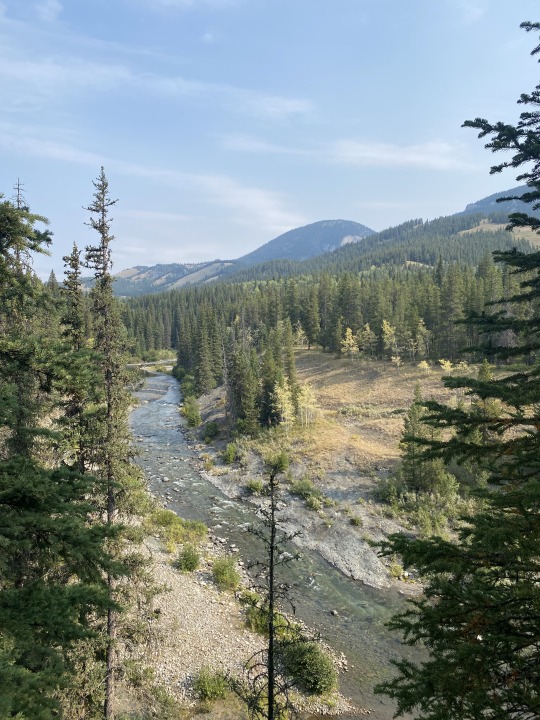
A photo I took last summer in southern Alberta while I was backcountry camping
Progressing through my degree has taught me a lot about the complex systems that uphold the foundations of the environment. As I leaned more and experienced more, I believe that my respect and love for nature grew as well and allowed me to see natural beauty in small things. I noticed this when standing on top of a mountain looking over the endless forest of green coniferous trees that crept up the mountains and listening to the wind rip through the valley. I found myself thinking of the time it took for environmental processes to create the awe-inspiring view I was looking at.
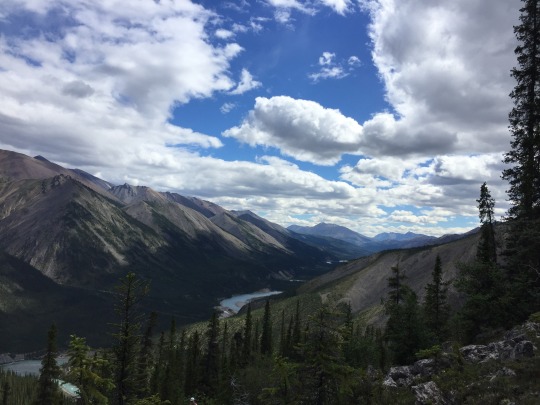
My sense of nature come from both my family and friends. My parents were the first ones to expose me to nature as a young kid. From growing up on a farm in a farming community to encouraging me to play sports where I was outside, camping, fishing, hiking, canoeing, and letting me explore, I was able to create the foundation of my relationship. My friends where the ones who allowed me to continue to evolve my relationship as they showed the same interest as me. As I grew up and my family could no longer do some of the activities mentioned earlier, I continued to do them with friends and take my experiences more to the extreme with entering backcountry camping in the Rocky Mountains time and time again. Additionally, as a kid and to this day I am always watching content related to nature such as BBC’s Planet Earth, River Monsters, survival shows, and YouTube videos on environmental processes.
I am excited to continue to share my experiences and hear about others throughout the course!
2 notes
·
View notes
Text

✨Eclipse Enchantment✨
One of our planet's most stunning sights is coming to the skies - a super blood Moon on Monday 16th May 2022.
In the year's only full lunar eclipse, Earth will come between the Sun and the Moon.
Falling fully into Earth's shadow, the Moon will slowly darken before turning dusky red.
It will be visible with the naked eye before dawn on Monday in most of Europe. The Americas will get a great view on Sunday evening.
The Moon will appear larger than usual because it will be at its closest point to Earth of its orbit, giving it the name super Moon.
It will also be called a super flower blood Moon. In the Northern Hemisphere, a full moon in May is often called a flower Moon because it coincides with the Spring flowers.
The only sunlight reaching the Moon during the full eclipse will be passing through the Earth's atmosphere. This light will be blood red, from all Earth's sunrises and sunsets reflected on to the Moon's surface, explains Dr Gregory Brown, astronomer at the Royal Observatory in Greenwich, London.
"You'll actually be seeing every sunrise and every sunset occurring around the Earth at once. All of that light will be projected on to the Moon," he told BBC News.
Sending Mooncraft Magick to you and your loved ones. 💙💙 Image by Amanda Clark. Source: https://www.bbc.co.uk/news/science-environment-61423765
#magick #wiccaaltar #gaia #nature #winter #beautyofwinter #wicca #wiccaaltar #wiccanofinstagram #pagan #paganofinstagram #paganaltar #witchesofinstagram #wheeloftheyear #druidsofinstagram #manifestation #nature #moonmagick #goddess #fullmoon #magickaltools #herbsoftheearth #toolsofthecraft #blessings #moonphases #selenophile #rituals #eclipse #bloodmoon #bloodmooneclipse #may2022
#wicca#wiccan#earth witch#magick#earthmagick#nature#mooncraftmagick#wiccalife#spiritual#pagan#earthwitch#gaia#divination#trees#beauty of nature#eclipse#bloodmoon#lunar eclipse#may2022#goddess#moonmagick
69 notes
·
View notes
Photo
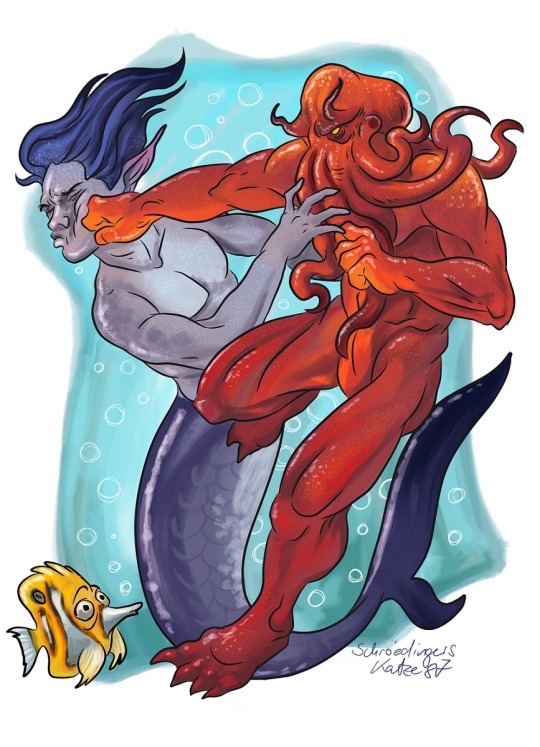
Late Mermay. Had the sketch done way earlier but didn’t get around to it until now. Based on this lovely BBC article https://www.bbc.com/news/av/science-environment-55426584 about octopuses (?) punching fish out of spite.
52 notes
·
View notes
Note
i had the idea of shifting to a BBC Ghosts (tv show if u haven’t heard of it) DR where I am one of the ghosts. it got me thinking,, that couldn’t possibly be feasible because that’d mean i was dead,, which therefore confirms the existence of ghosts as a part of the afterlife. or does the afterlife differ from reality to reality. kinda like anyone who shifts supernatural or percy jackson or anything that involves religious figures or demons n stuffs,,, does that mean that heaven and hell or God(s) exists in those realities without question? does that mean that the greek gods actually exist in all realities or just those specific realities. do realities that contain angels and devils confirm the existence of God throughout every reality or just some realities. in that case, why are the existences of entire Gods confined to different realities (or not). referring back to the Ghosts DR,, if i managed to shift as a ghost, what would happen to me if i moved on. would my consciousness/awareness be evaporated with that reality or would my awareness return to my CR or a completely new random reality. if so, does that then also confirm the idea that when we die our consciousness shifts to a random reality and that’s why our CR feels so random and ‘boring’ in comparison to our DR??? then what about zombie apocalypse DRs,, if you forget to script that you don’t get turned what happens if u get bitten and become a zombie. you would technically be dead, so would you shift to a random reality or back to CR,, or would you remain trapped in the brain of a rotting corpse because you’re still ‘alive’ in a sense.
sorry if this is overwhelming,, i just feel like i need some help clearing things up so that i understand what kind of things i’m getting myself into when i shift
trigger warning: talks of religion, death, “moving on”, what happens after death, etc.
just because i know that for some this is hard to think and talk about, so feel free to skip this ask!
okay so this is a lot so i’m gonna try to touch on some things here and there if that helps - i’m also not religious but can give some of my thoughts as someone who grew up in a religious environment. this would also be a good conversation to open up to the community because i’m sure everyone will have different beliefs and perspectives that could possibly help explain it - but a part of shifting is not fully understanding the science behind it so everything is just theory as of right now.
firstly with the things with ghosts and gods and spirituality: in my opinion there is so many realities, so many different ways these places can work, along with your own beliefs, that it just depends on what you think. i believe that all religions are correct in some way and that whatever your idea of afterlife is where you’ll end up, and in the world of say percy jackson, that’s kind of how things are. there’s greek, roman, egyptian, even christianity all coexisting and working in their own ways. religion for a lot of people is for comfort, to explain things that can’t be fully explained. so i don’t think certain realities confirm or deny that there’s forces beyond our understanding that created everything and us. it does open up the possibility that there is no religion in some realities, but who’s to say that that means there’s no actual gods? it’s all unknown, while in some realities it’s more known, it’s unknown in others but i don’t see it as denying that it would exist in say this reality or others because we just don’t know. religion is confusing and hard to think about, but in the end there is still the consciousness theory which is also a valid way to look at shifting. so i feel like it’s up to your own interpretation but as a whole it’ll just be an unknown as proving and disproving in certain realities because how do you prove a god or religion exists? there’s factual things in history that happened and documented, but does that prove it fully?
the thing with being a ghost is that you’re consciously there. if you moved on in that reality, you’ll most likely just shift back to your original reality. that’s what has happened for people who say got hit with the avada curse in harry potter (specifically c [@/cshitposts on tiktok]) who just shifted back to their original reality. because you’re consciously not there if that makes sense? your awareness of that reality goes away, so you become reaware of the reality you originally came from.
the same with a zombie, you get bitten and fall into the madness you can always just shift back? i mean when you shift you can always shift back, you can’t get stuck there so if you forget to script something like that and get bitten you can just shift back, script it, and then shift to a parallel reality where you’re immune. so i don’t think that’s really a problem but taking into consideration with permashifting and stuff: i think if you consciously thought about it before you shift and didn’t script it it would still work. scripting isn’t necessary and your subconscious knows what reality you’re wanting to go to so even then it shouldn’t be a problem. and if that did happen you can always just shift to a different reality and stay there instead.
about what happens after we die: i don’t know. if some people theorize that we shift to a different reality when we die then they can believe that! again there’s not a lot of scientific knowledge on shifting so everything is our best guess and theories, not cold hard facts. if that’s what you want to believe happens after we die then cool! nobody truly knows until they die. i don’t think anything would confirm that though because again: we don’t know until it actually happens and even then how would you go about proving that. afterlife could be different in different realities, it might be the same, it might just depend on if you believe it or not in this one and subconsciously affect the one you’re going to. who knows!
i think these are good questions but not something to overthink about. i’m not religious nor do i think about religion a lot so i’m not the best person to really ask this kind of question but i hope maybe my thoughts helped? idk, i’d love to open this discussion up for the community and religious shifters, what theory they believe in, etc. because it’s an interesting question (in regards to religion and gods across realities). hopefully that helped? i think my thoughts are all over the place so i open this conversation up, just please be respectful and kind to each other about it because at the end of the day we’re just trying our best to understand and explain things. we may never actually know the answers but i think everyone has a different perspective and opinion on it so maybe seeing a couple different ones would help!
#i’m sorry if it sounds too blunt or anything i promise i’m not trying to be rude in my answers#that was a lot to think about so yeah#what are your thoughts i would love to know#trigger warning#maes asks#reality shifting#shifting#quantum jumping#shiftblr#scripting#shifting community#desired reality#shifting realities#mae talks shifting#religion trigger warning#tw death#tw religion#tw ghosts#tw
2 notes
·
View notes
Audio
Tyondai Braxton - Telekinesis
Telekinesis—an eighty-seven-piece work for electric guitars, orchestra, choir and electronics—will be released on November 11, 2022, via New Amsterdam and Nonesuch Records. Featuring the Metropolis Ensemble conducted by Andrew Cyr, the Brooklyn Youth Chorus conducted by Dianne Berkun Menaker, and chamber choir The Crossing conducted by Donald Nally, Telekinesis is the first studio recording of the work.
Telekinesis is the result of a co-commission by the Southbank Centre London and Musica Nova, Helsinki Festival. The world premiere took place on April 18, 2018 at Queen Elizabeth Hall with the BBC Concert Orchestra and BBC Singers, followed by a performance at Helsinki Festival by the Finnish Radio Symphony Orchestra. Andre de Ridder conducted both performances.
Braxton calls Telekinesis “the latest and largest example of intersections between my electronic music and notated music, both sonically and philosophically.” Throughout the recording and production process, Braxton sought to “create an environment where electronic instruments and acoustic instruments coexist in a place that feels balanced and organic.” To achieve that, the orchestra, choir, and electronics were tracked section by section at Oktaven Audio in Mt Vernon, New York from August 2021 to March 2022 by engineer Ryan Streber. This allowed for a hyper-detailed mix session with Seth Manchester at Machines with Magnets in Pawtucket, RI. As a studio recording, the mix recreates how an orchestra would be placed (with some exceptions), but is exaggerated in its width and in the closeness and depth of certain instruments, surrounding the listener.
Braxton says: “As a science fiction and horror fan, the initial idea was to write an opera based on the Japanese manga masterpiece Akira, although over time, I realized I was more interested in the story as an invisible thematic guide rather than something more literal. Among a number of storylines in Akira is the idea that a young boy comes upon the ability to move objects and generate energy with his mind. Entirely enthralled with his own power and apparent limitless potential, and despite his inability to physically and mentally control this force, he launches unrestrained into its use. Ultimately, his hubris overtakes and destroys him. The power of the mind has been a compelling consideration for me and is an underlying theme in this piece.”
Composer, Electronics, Celeste:
Tyondai Braxton
Metropolis Ensemble:
Andrew Cyr, artistic director/conductor
Brooklyn Youth Chorus:
Dianne Berkun Menaker, conductor
The Crossing:
Donald Nally, conductor
Cover Art: "Sanctuary City" by Grace Villamil
#Tyondai Braxton#electronic#orchestra#the crossing#donald nally#choir#experimental#avant-garde#2022#metropolis ensemble
6 notes
·
View notes
Photo

Heat wave in India leaves millions struggling to cope (Sharanya Hrishikesh, BBC News, April 28 2022)
“While heatwaves are common in India, especially in May and June, summer began early this year with high temperatures from March itself - average maximum temperatures in the month were the highest in 122 years.
Heatwaves also began setting in during the month.
The Centre for Science and Environment, a think-tank, says that early heatwaves this year have affected around 15 states, including the northern state of Himachal Pradesh, known for its pleasant temperatures.
This week, the mercury in the capital, Delhi, is expected to cross 44C. (…)
Farmers say the unexpected temperature spikes have affected their wheat harvest, a development that could potentially have global consequences given supply disruptions due to the Ukraine war.
The heat has also triggered an increase in power demand, leading to outages in many states and fears of a coal shortage.
Mr Modi also flagged the increased risk of fires due to rising temperatures. (…)
D Sivananda Pai, director of the Institute for Climate Change Studies, points to other challenges too, apart from climate change - such as increasing population and the resultant strain on resources.
This, in turn, leads to factors that worsen the situation, such as deforestation and increasing use of transport.
"When you have more concrete roads and buildings, heat is trapped inside without being able to rise to the surface. This warms the air further," Mr Pai says.
And the cost of such extreme weather events is disproportionately borne by the poor.”
10 notes
·
View notes
Text
BBC | Broadcasting Breaking News Sport TV Radio
BBC | Broadcasting Breaking News Sport TV Radio
BBC | Broadcasting Breaking News Sport TV Radio
Breaking news, sport, TV, radio and a whole lot more. The BBC informs, educates and entertains – wherever you are, whatever your age.
Top Stories
World
Business
Politics
Health
Education & Family
Science & Environment
Technology
Entertainment & Arts

View On WordPress
#BBC#BBC | Broadcasting Breaking News Sport TV Radio#bbc bbc weather#bbc breakfast#bbc business#bbc channel#bbc news#bbc news africa#bbc news articles#bbc news asia#bbc news breaking news#bbc news broadcast#bbc news business#bbc news radio#bbc news today#bbc sport#bbc world news#Broadcasting Breaking News Sport TV Radio#daily bbc news
2 notes
·
View notes
Text
Dazzling artwork found at ancient city of Pompeii - BBC News
Dazzling artwork found at ancient city of Pompeii - BBC News https://www.bbc.com/news/science-environment-68777741
0 notes
Text
White House wants Moon to have its own time zone - BBC News
https://www.bbc.com/news/science-environment-68722032
View On WordPress
0 notes
Text
The Modern Space Race is a Waste of Money
Spending money on a modern-day space reason isn't the best idea. This argument has two major reasons, which are detailed below: Humanity's inability to adapt to life in space, and the worsening of the climate crisis here on Earth.
To begin, these two reasonings should look interconnected to you, because they are. For decades, one of the pushes behind a modern space race has been the idea of finding a new home for humanity. Just think about how many times you've heard someone talk about colonizing the moon or Mars. But this isn't really a good idea, because the human body is not suited to outer space. In an October 2023 article from the Scientific American, writer Sarah Scoles identifies multiple ways that outer space seems practically designed to kill humans and similar species. Some of the examples include cancer from cosmic rays (way worse than sunburn with no atmosphere in the way!), the problem of growing food or finding water without proper atmospheric conditions, and even the ways differing gravity can cause cells to age faster or joints and bones to stress improperly. Long story short, humans were not built to survive in space.
This seems like a bad situation, considering the second reason why modern space travel isn't worth the money: pollution. Publications such as The Guardian (2021), the BBC (2022), and Time Magazine (2023) have all put out articles outlining exactly how the extra pollution from the modern space race is effectively killing Earth, and therefore the only habitat on which humans are guaranteed to survive, faster. For example, emissions from rocket flights get trapped in the upper atmosphere, where it can take two or more years to disperse. This contributes to the warming of our planet, making our ongoing battle with climate change-induced natural disasters worse. Since these space flights, especially those by private entities such as SpaceX and Blue Origin, happen more often than once every two to three years, there's no time for those emissions to disperse before they're replaced. In short, the warming effect compounds every time we, publicly or privately, launch a rocket.
By making pollution worse on Earth, we're leaving ourselves fewer options for survival. Humans weren't built to survive in outer space, yet space flights continue to destroy our natural habitat. All the money that's pumped into the modern space race would be better spent on conservation efforts here on Earth, such as reducing emissions, fostering plant growth, and establishing green infrastructure. Our dollars should focus on saving the home we already have, rather than trying to reach one that wasn't meant for us.
Sources:
https://www.scientificamerican.com/article/why-well-never-live-in-space/#:~:text=The%20cancer%20risk%20from%20cosmic,spending%20big%20money%20on%20it
https://www.theguardian.com/science/2021/jul/19/billionaires-space-tourism-environment-emissions
https://www.bbc.com/future/article/20220713-how-to-make-rocket-launches-less-polluting
https://time.com/6273065/space-travel-climate-impact/
0 notes
Text
Japan makes contact with 'Moon Sniper' on lunar surface - BBC News
Japan makes contact with ‘Moon Sniper’ on lunar surface – BBC News https://www.bbc.co.uk/news/live/science-environment-68019846
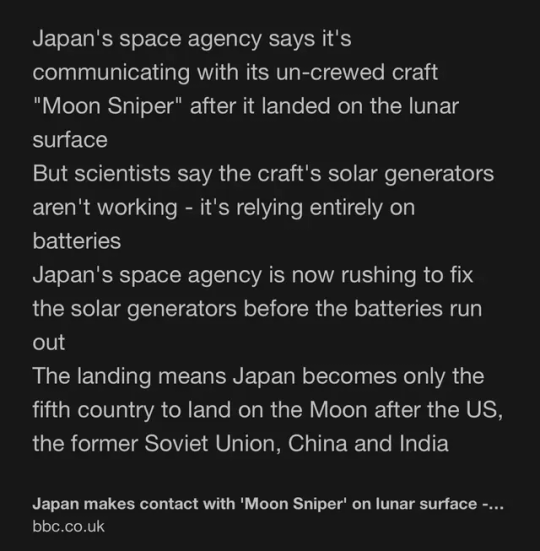
View On WordPress
0 notes